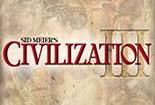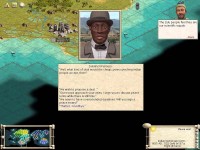|
|
|
 The
The Civilization series carries with it the unique
distinction of being one of the first non-FPS
reviews ever published at the Adrenaline Vault;
back then we warned readers that "Civ 2 is highly
addictive." Now over five years later, Infogrames
and Firaxis have teamed up to renew one of the most
legendary turn-based strategy games ever created in
Sid Meier's Civilization III. Given the vast lapse
of time since Civilization was last seen, we must
ask if Firaxis has managed to recreate the
addictive qualities of the series, without
compromising the gameplay to meet modern
expectations. The
The Civilization series carries with it the unique
distinction of being one of the first non-FPS
reviews ever published at the Adrenaline Vault;
back then we warned readers that "Civ 2 is highly
addictive." Now over five years later, Infogrames
and Firaxis have teamed up to renew one of the most
legendary turn-based strategy games ever created in
Sid Meier's Civilization III. Given the vast lapse
of time since Civilization was last seen, we must
ask if Firaxis has managed to recreate the
addictive qualities of the series, without
compromising the gameplay to meet modern
expectations.
Civilization
has never carried a distinct storyline with it,
which is one of its greatest strengths -- it allows
the player to determine the "adventure" each time a
new game is started. This time out, Firaxis has
chosen to focus more on the details of each
civilization by assigning not only two overall
traits to each nation, but also a special (and
somewhat unique) specialty unit. For example, the
Americans have the qualities of being Industrious
and Expansionist. In gameplay terms, being
Expansionist starts you with a Scout and makes
Barbarian villages more lucrative; being
Industrious allows your Workers to complete tasks
faster than normal and allows large cities to
produce more production shields. In addition to
each civilization having certain qualities, each
also begins with two technology advances: for the
Americans this is Masonry and Pottery. Finally, as
mentioned above, each also has its own specialty
unit. These are similar to those other
civilizations can obtain through research, but more
refined by comparison. For instance, the Americans'
special unit is the F-15; while other nations can
research Jet Fighters, they are not nearly as
powerful, resulting in the Americans often
commanding air superiority.
As
hinted at above, Firaxis has also changed the
dynamics of Civilization's gameplay, no doubt in an
effort to alleviate non-essential elements that
slowed down the action in the past. Perhaps the
biggest alteration since Civilization II is that
units no longer have home cities, nor do they
require production shields or food as upkeep. Both
elements tended to bog down games as cities grew
increasingly unhappy and unproductive as units
moved around the map. Instead, all units in
Civilization III are supported directly from your
treasury, with some government types providing a
number of units free of these costs. As experienced
players may imagine, it is now possible to generate
and maintain vast military forces.
 Another
major change for the series comes from the
elimination of trade as a manual affair of moving
Caravans across the map. Firaxis has greatly
streamlined trade by making it largely a part of
diplomacy and transportation networks. Cities in
your empire now start trade automatically once they
are connected to one another via a road, harbor, or
airport -- note, however, that is it no longer
possible to trade food as it was in Civilization
II, so starvation can occur often. Once your
transportation network is connected to another
nation's capital, you can use the enhanced
diplomacy system to initiate trade for excess
resources you control. Another
major change for the series comes from the
elimination of trade as a manual affair of moving
Caravans across the map. Firaxis has greatly
streamlined trade by making it largely a part of
diplomacy and transportation networks. Cities in
your empire now start trade automatically once they
are connected to one another via a road, harbor, or
airport -- note, however, that is it no longer
possible to trade food as it was in Civilization
II, so starvation can occur often. Once your
transportation network is connected to another
nation's capital, you can use the enhanced
diplomacy system to initiate trade for excess
resources you control.
Trade
leads us to yet another major update in the series,
and in fact, the primary driving force of the
entire game: strategic resources and luxury goods.
Rather than having special goods such as wine and
silk be simply bonuses to a piece of terrain,
Firaxis has both streamlined and enhanced their
usefulness. For example, luxury goods such as wine,
silk, ivory and gems, now serve one primary
function -- to make your people happy. For each
luxury good under your control, one citizen is made
content or happy in each city connected to the good
via your trade network. Strategic resources have
much broader implications, as these will often
cause wars, and include things like iron, rubber,
uranium, and aluminum. Strategic resources are now
required to build certain units once you've
discovered the appropriate technology. For
instance, the Romans' special unit is the
Legionnaire, who only becomes available once you've
researched Iron Working. However, if your territory
doesn't contain any iron deposits, you won't be
able to build any units which require it; thus, in
the above example, the Romans would be without
their primary asset and at a severe disadvantage.
Furthermore, strategic resources only become
visible on the map once you've researched the first
technology to require it. So as above, you wouldn't
even be able to locate iron until you had
researched Iron Working. Fear not, however, as
strategic resources will occasionally appear (or
vanish) throughout a game.
[
page
1
]
[
page
2
]
|
|
|